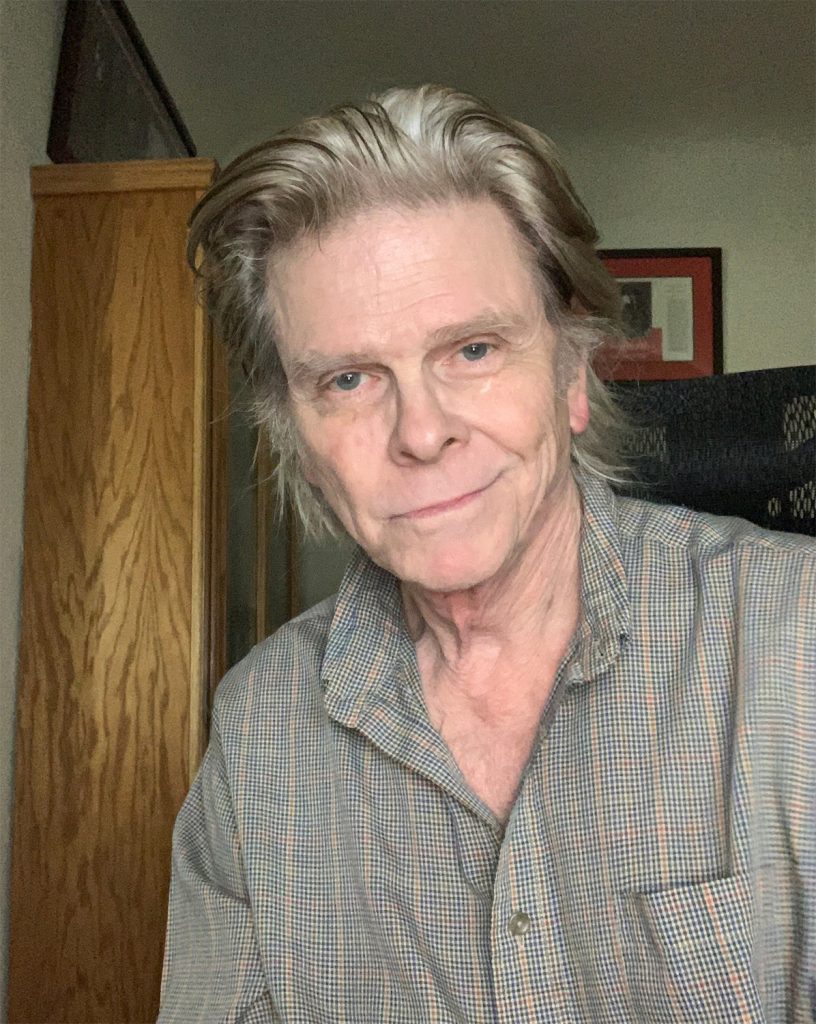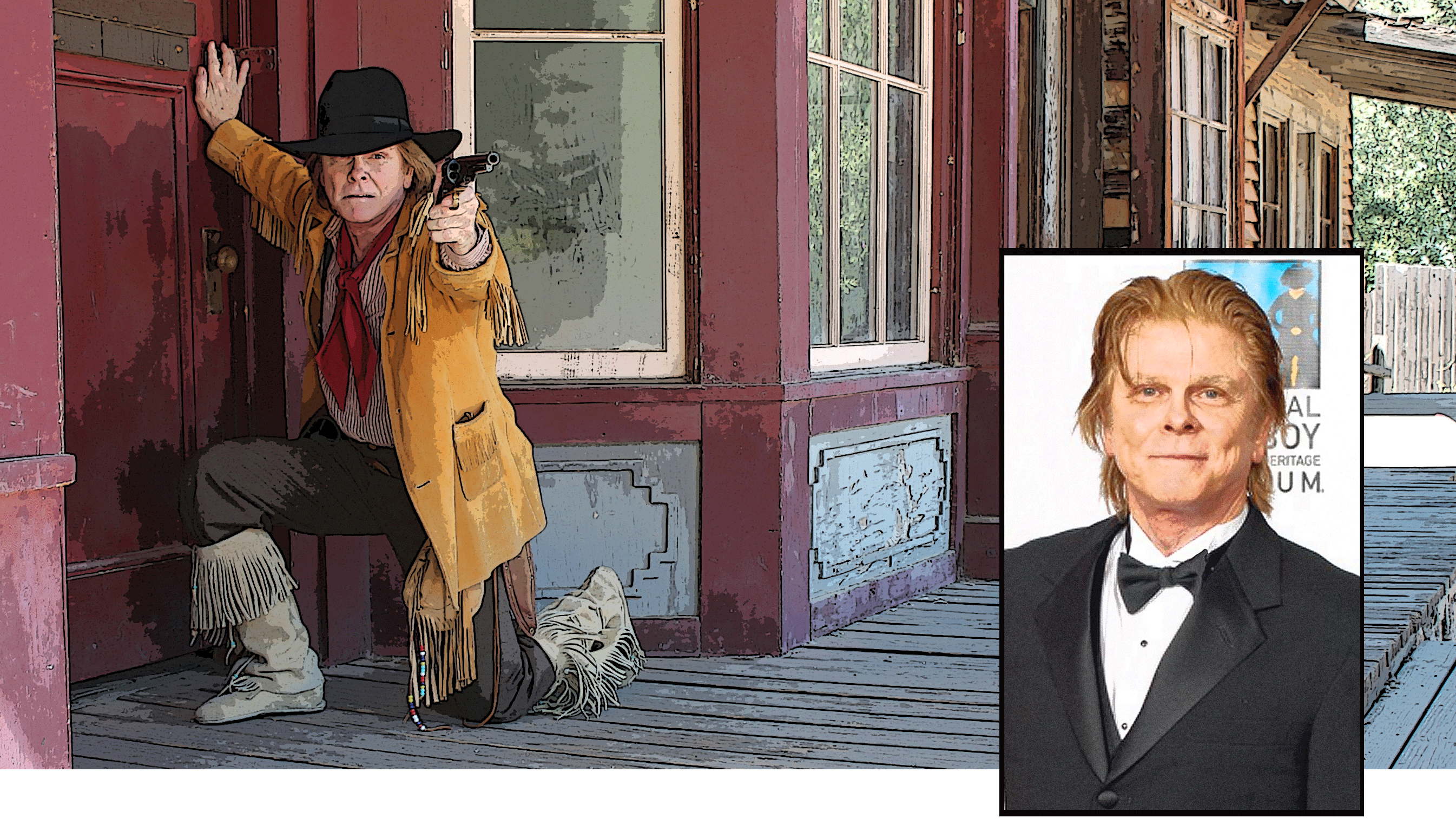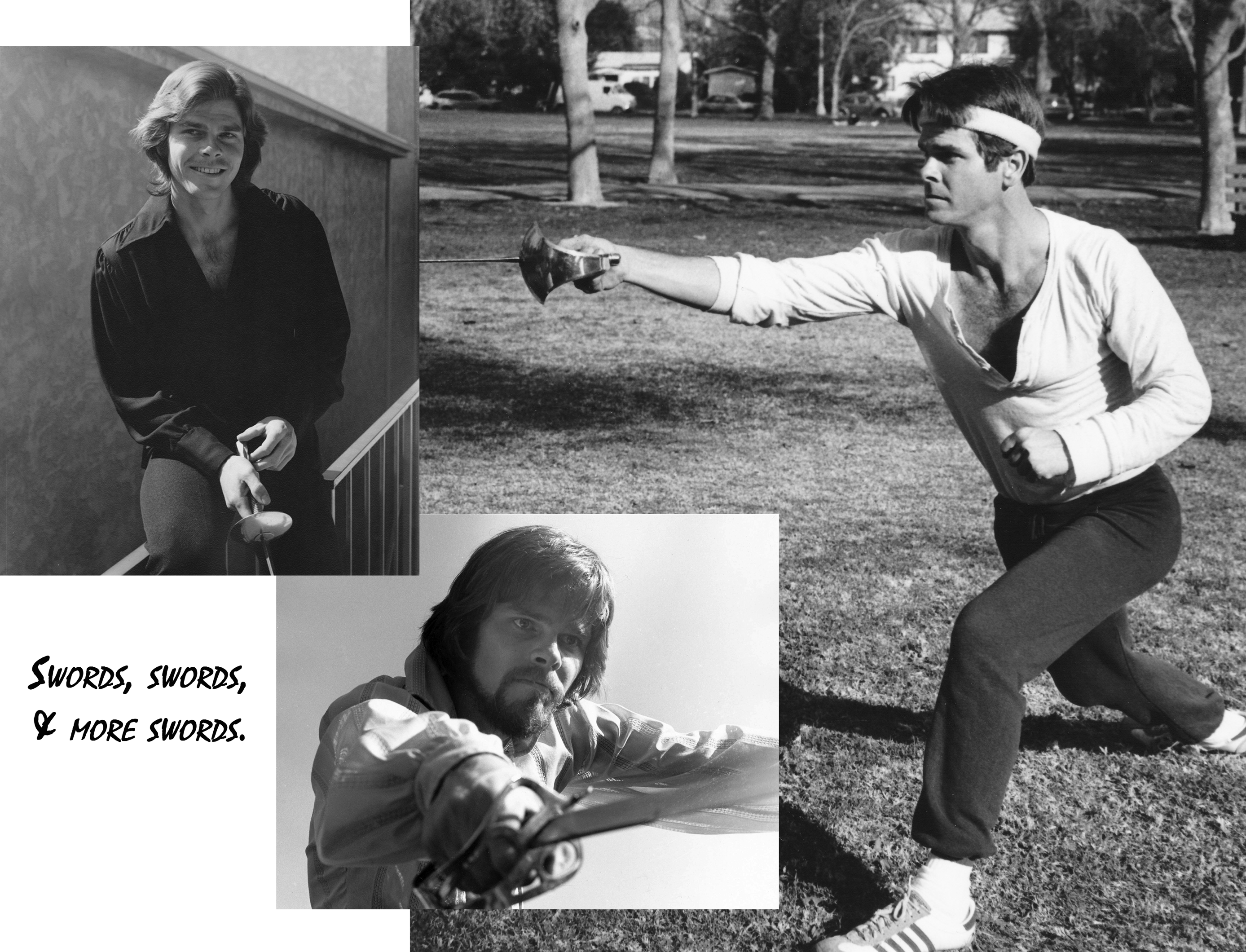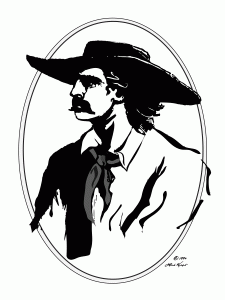Below you’ll see that I have mostly written about the American Indian wars and race relations. But when Sand Creek and the Tragic End of a Lifeway was published in March 2020 it marked the beginning to what would become the next phase of my writing life.
That same March 2020 (which also marked the total interruption of all of our lives when COVID-19 became reality) I was pitched to create a second Louis Kraft Collection by Tomas Jaehn, the director of the University of New Mexico’s Center for Southwest Research & Special Collections (CSWR). I said that I already had a Louis Kraft Collection at the Fray Angélico Chávez History Library, Museum of New Mexico, Santa Fe, but Tomas told me that I could have two collections.
It took me all of 10 seconds to say, “yes.”
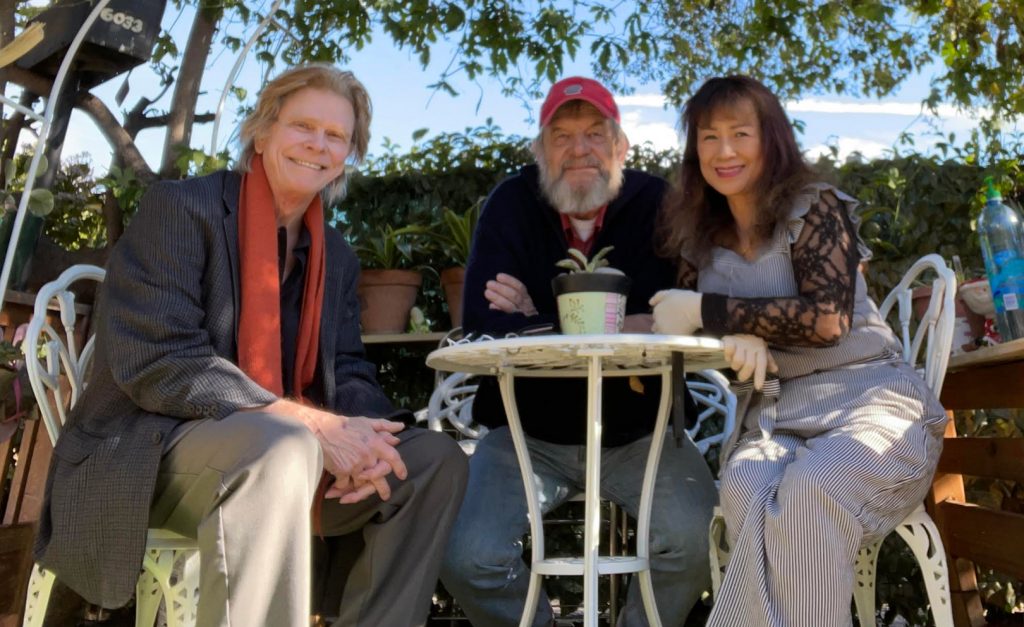
From left: Louis Kraft, Tomas Jaehn, and Pailin Kraft in the breakfast area that Pailin created in her garden that encompasses all of Tujunga House on 15dec2021. (photo © Pailin Kraft, Tomas Jaehn, and Louis Kraft 2021)
Pailin and I made the first delivery to UNM in June 2021 and the director of CSWR Tomas Jaehn picked up the second delivery at Tujunga House on December 15, 2021. Writing wise, between March 2020 and December 2021 impacted my writing life (certainly stopped me posting new blogs; the last was in September 2020), and put my next book, Errol & Olivia, on major periods of total hold. With the year 2022, and finally beginning in March 2022, I’m finally back on Errol & Olivia, and my scheduled book writing future that is before me. For many of my readers/fans this has been total shock. Basically, “Say it isn’t so, LK.” Alas it is so, and it is now my future:
Great times for LK as his future has not only begun but is finally in progress. This said, more deliveries will be made to the LK Collection in the upcoming years (and perhaps even one in 2022).
Perhaps the kindest words anyone has ever said to me
Great Custer and Little Big Horn historian and friend Frederick Wagner III, on 20mar2022, said the following to me: “It is nice to have a famous friend… especially one as nice and as kind as you.” Wow! I don’t think anyone has ever said kinder words to me. “My friend,” I replied to Fred, “I cherish what you said. Thank you. But, there’s always a ‘but,’ … but in this case it’s a good ‘but.’ But this is how I view you, and your quote is perfect for describing you: ‘It is nice to have a famous friend… especially one as nice and as kind as you. AND you are. I’m lucky to know you.”
**********
For most of you, the name Louis Kraft is associated with the Indian wars, and to be more precise race relations during the Indian wars. All of my books have dealt with this, mainly how do the leading players work toward ending war. Not to worry, the website will never be political and I will do my best to avoid preaching. That said, mankind has never learned from the past, and most likely never will. As those of you who have read my books have probably guessed, I’m anti-war. I’m all for sitting down and talking out differences, but we all know that war is often fought because of desire and greed …
“You’ve got it and I want it.” Certainly racial prejudice enters the picture. … “My culture is more advanced than yours, my religion is true and yours is not, my race is superiors to yours.” Enough of the preaching (before we all vomit), … I have no intention of stuffing my views down your throats. Instead I hope to keep you updated on status of my writing and personal life, and hope to do in it in such a way that I entertain you. Now, even though most of you know me as a fellow who likes to walk those long-gone trails of yesteryear—the central and southern plains of the 1860s and the Southwest of the 1880s, there’s much more to my past life and what influenced me to be the writer and person I am today.
Like the Indian wars, I’ve grown up with American cinema, and spent my early years earning a living in the entertainment industry (there’s some stories here—if I work up the guts to share them, I will).
I discovered actor Errol Flynn as a boy. He grabbed my imagination and never let go—some of his films became key to what would become my life. Flynn introduced me to George Armstrong Custer in They Died With Their Boots On, and this led to my interest and involvement in the Indian wars and race relations (I hope to share some of this), and eventually a career change from acting to writing. Flynn also introduced me to piracy, read Francis Drake, in The Sea Hawk. Warner Bros. owned the rights to Rafael Sabatini’s great novel but jettisoned the story while keeping only the title. Flynn’s playing of Geoffrey Thorpe in The Sea Hawk influenced me as much as his playing of Custer, and I have promised myself to one day write about Drake. Not to fear, for Flynn’s Custer also introduced me to actress Olivia de Havilland and her portrayal of Libbie Custer. I’ve been in contract with Olivia and have known her long distance and up close since the mid-1990s. I’ve been writing articles and speaking about Mr. Flynn and Ms. de Havilland since in the 1990s. They are up front and center in my writing life.
I became interested in the West in the 1970s; in particular in the people who didn’t speak the same language but who were able to work out their differences without killing each other. To understand these people and the land they inhabited, I immersed myself in their struggle for survival.
 In the mid-1980s I began writing and speaking about them. In the mid-1980s I began writing and speaking about them. The Final Showdown (Walker and Company, 1992), a western set against the backdrop of the Medicine Lodge peace council in 1867 Kansas, explores relationships during a critical time in Cheyenne history. Custer and the Cheyenne: George Armstrong Custer’s Winter Campaign on the Southern Plains (Upton and Sons, 1995) follows Custer’s 1868–1869 winter campaign on the Southern Plains after the battle of the Washita, a campaign wherein Custer had two armies at his back that craved blood, a campaign he pulled off without additional bloodshed. Gatewood & Geronimo (University of New Mexico Press, 2000) examines the relationship between the two pre-eminent warriors of the last Apache war. Not finished with Gatewood, I pieced together and edited (read pulled apart and reassembled while removing Gatewood’s passive word usage) the lieutenant’s aborted attempt to write about his years walking among the Apaches while filling in the gaps in his telling of the story with additional text (approximately two-thirds of the words are mine) in Lt. Charles Gatewood & His Apache Wars Memoir (University of Nebraska Press, 2005). Ned Wynkoop and the Lonely Road from Sand Creek (University of Oklahoma Press, 2011) is the first full-length biography of Wynkoop and his relationship with Cheyennes and Arapahos.
In the mid-1980s I began writing and speaking about them. In the mid-1980s I began writing and speaking about them. The Final Showdown (Walker and Company, 1992), a western set against the backdrop of the Medicine Lodge peace council in 1867 Kansas, explores relationships during a critical time in Cheyenne history. Custer and the Cheyenne: George Armstrong Custer’s Winter Campaign on the Southern Plains (Upton and Sons, 1995) follows Custer’s 1868–1869 winter campaign on the Southern Plains after the battle of the Washita, a campaign wherein Custer had two armies at his back that craved blood, a campaign he pulled off without additional bloodshed. Gatewood & Geronimo (University of New Mexico Press, 2000) examines the relationship between the two pre-eminent warriors of the last Apache war. Not finished with Gatewood, I pieced together and edited (read pulled apart and reassembled while removing Gatewood’s passive word usage) the lieutenant’s aborted attempt to write about his years walking among the Apaches while filling in the gaps in his telling of the story with additional text (approximately two-thirds of the words are mine) in Lt. Charles Gatewood & His Apache Wars Memoir (University of Nebraska Press, 2005). Ned Wynkoop and the Lonely Road from Sand Creek (University of Oklahoma Press, 2011) is the first full-length biography of Wynkoop and his relationship with Cheyennes and Arapahos.
The Wynkoop-Cheyenne story was long-coming, but one that has been with me since the 1980s when I began writing articles and speaking about him (he even played a key role in The Final Showdown). Here’s a bit of heresy for you—in my humble opinion Ned Wynkoop was the most important white figure during the Cheyenne wars of the 1860s. He knew everyone on both sides of the conflict while fighting to prevent or end war and struggling to feed starving people. While other whites (soldiers, politicians, civilians) came and went, he was front and center and proved to be one big pain in the ass to the U.S. government. He had courage, conscience, and compassion—wish I had more of all three.
Wild West magazine has interviewed me three times over the years. In 2009 Johnny Boggs asked great questions and captured where I’ve been and where I’m headed. It gives you an idea of what drives my writing.
See the full Boggs interview of Kraft on HISTORYnet.com
Boggs is multi-talented. He is one of the best novelists working today
(and I don’t care what the genre is). He is editor of the Western Writers of America
bi-monthly, Roundup Magazine, and is an ongoing contributor
to various magazines including Wild West.
Recently, actually in spring 2014, Indian wars writer/historian Jeff Barnes, who has a terrific Facebook page titled “Books of the Indian Wars,” asked if he could interview me for the page. I’m wordy, and he published the interview on his website/blog at the end of July 2014. It provides additional information on my life and writing.
See the full Barnes interview of Kraft on http://northernforts.blogspot.com/
Barnes has focused on the Northern Plains Indian wars. He has an
ongoing series of successful books that deal with tracking participants
and locations that are key to the Indian wars, including
George Armstrong Custer, Buffalo Bill Cody, and
military forts of the Northern Plains.
| Louis Kraft writer © Louis Kraft 2013–2024 |

